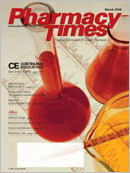Publication
Article
Pharmacy Times
Alternative Measures for Treating Pediculosis
Author(s):
Head lice infestation, or pediculosis,is a common problem, particularlyamong children aged 3 to12. Although typically not dangerous, theproblem can cause embarrassment anddiscomfort among sufferers. Intense itchingand inflammation of the scalp areaare the most common symptoms, and insome cases excessive scratching caneven lead to infection. Pediculosis is highlycontagious, and it is important to treatthe infestation as soon as possible.
Symptoms of infestation include thepresence of nymphs (newly hatchedlice) or adult lice, which are about thesize of a sesame seed, or nits, whichare the eggs laid by the adult lice fromwhich the nymphs hatch. Nits may bemistaken for dandruff, but they arestuck to the hair shaft and usually cannotbe brushed out.1
Many options, both prescription andOTC, exist for treating head lice. Still othersare available through a compoundingpharmacist. One of the most commontreatments in the United States involvesthe use of permethrin, a pesticide availablein OTC preparations such as Nix andRID. Permethrin can be very effective inthe treatment of pediculosis. It usuallyrequires only a single application andmanual removal of the nits.2
Another topical pesticide used in theUnited States is malathion, a prescriptiontreatment for lice marketed under thename Ovide. This product is applied tothe hair, is allowed to dry, and then iswashed out with a nonmedicated shampooafter 8 to 12 hours. Adverse reactionsto malathion and permethrin includescalp rash and temporary exacerbationof symptoms.2 Patients who areimmunocompromised may be advisedagainst using such treatments, and thesetreatments generally are not recommendedfor use on infants.
Other treatments, both medicated andnonmedicated, are available through acompounding pharmacy, which mayoffer the patient more options than thecommercially available ones. Ivermectinhas been shown to be effective in treatingpediculosis, although no topical formis currently available commercially.Ivermectin can be prepared by an experiencedcompounding pharmacist in alotion or cream-rinse base.3
Certain preparations also are availablethat may be appropriate when theuse of pesticides is contraindicated oris for any reason undesirable. A compoundingpharmacist can prepare a topicallotion consisting of 1% to 2% cetylalcohol in a base, which will cause theexisting lice to suffocate. The preparationis applied to the hair and allowed to dry.The hair is carefully combed to removeany remaining nits. This treatment maybe repeated if necessary.
Another nonchemical preparationcontains pennyroyal, eucalyptus, androsemary oils in an olive oil base. Thiscompound is combed through the hairwith a regular comb. A metal lice combis used to remove live lice and nits. Thehair should then be covered, and thepreparation is left on overnight. Thistreatment usually is effective with 1application, but it may be repeated.4
Preventive measures may be availableas well, for use following treatment ofpediculosis. Shampoos and conditionerswith tea tree oil may be prepared andcan help prevent reinfestation. A lice-repellentspray can be prepared thatcontains ylang ylang, anise, and coconutoils.4 These oils have scents that are naturallyrepellent to the lice, and they oftenare combined in a bitter-tasting isopropylalcohol base. Other preventive aromaticlice treatments include essential oilssuch as ginger oil, geranium oil, jojoba,thyme, lavender, or peppermint oil.5
It is important to consider all availablemethods when determining thecourse of treatment for head liceinfestation. Compounding pharmaciesoffer a host of options unavailable onthe commercial market, includingmany treatments that are nonchemicalin nature. Compounding allows theprescriber to think outside the box,and the treatment can be tailored tothe needs of the individual patient.
Ms. Fields is with the InternationalJournal of Pharmaceutical Compoundingand is a pharmacy technicianat Innovative Pharmacy Servicesin Edmond, Okla.
For a list of references, send astamped, self-addressed envelope to:References Department, Attn. A. Stahl,Pharmacy Times, 241 Forsgate Drive,Jamesburg, NJ 08831; or send an e-mailrequest to: [email protected].
For More Information
The International Journal ofPharmaceutical Compounding(IJPC) is a bimonthly scientific andprofessional journal emphasizinghigh-quality pharmaceutical compounding.The journal covers topicsrelevant and necessary toempower pharmacists to meet theneeds of today's patients. For moreinformation, or to subscribe toIJPC, visit www.ijpc.com, or call888-588-4572.

Newsletter
Stay informed on drug updates, treatment guidelines, and pharmacy practice trends—subscribe to Pharmacy Times for weekly clinical insights.






